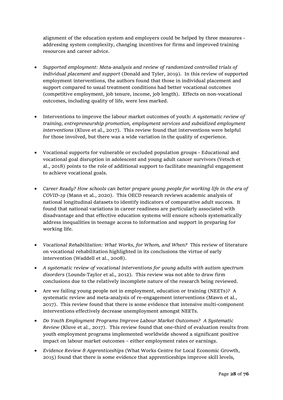
Page 28 of 76
alignment of the education system and employers could be helped by three measures -
addressing system complexity, changing incentives for firms and improved training
resources and career advice.
• Supported employment: Meta-analysis and review of randomized controlled trials of
individual placement and support (Donald and Tyler, 2019). In this review of supported
employment interventions, the authors found that those in individual placement and
support compared to usual treatment conditions had better vocational outcomes
(competitive employment, job tenure, income, job length). Effects on non-vocational
outcomes, including quality of life, were less marked.
• Interventions to improve the labour market outcomes of youth: A systematic review of
training, entrepreneurship promotion, employment services and subsidized employment
interventions (Kluve et al., 2017). This review found that interventions were helpful
for those involved, but there was a wide variation in the quality of experience.
• Vocational supports for vulnerable or excluded population groups - Educational and
vocational goal disruption in adolescent and young adult cancer survivors (Vetsch et
al., 2018) points to the role of additional support to facilitate meaningful engagement
to achieve vocational goals.
• Career Ready? How schools can better prepare young people for working life in the era of
COVID-19 (Mann et al., 2020). This OECD research reviews academic analysis of
national longitudinal datasets to identify indicators of comparative adult success. It
found that national variations in career readiness are particularly associated with
disadvantage and that effective education systems will ensure schools systematically
address inequalities in teenage access to information and support in preparing for
working life.
• Vocational Rehabilitation: What Works, for Whom, and When? This review of literature
on vocational rehabilitation highlighted in its conclusions the virtue of early
intervention (Waddell et al., 2008).
• A systematic review of vocational interventions for young adults with autism spectrum
disorders (Lounds-Taylor et al., 2012). This review was not able to draw firm
conclusions due to the relatively incomplete nature of the research being reviewed.
• Are we failing young people not in employment, education or training (NEETs)? A
systematic review and meta-analysis of re-engagement interventions (Mawn et al.,
2017). This review found that there is some evidence that intensive multi-component
interventions effectively decrease unemployment amongst NEETs.
• Do Youth Employment Programs Improve Labour Market Outcomes? A Systematic
Review (Kluve et al., 2017). This review found that one-third of evaluation results from
youth employment programs implemented worldwide showed a significant positive
impact on labour market outcomes - either employment rates or earnings.
• Evidence Review 8 Apprenticeships (What Works Centre for Local Economic Growth,
2015) found that there is some evidence that apprenticeships improve skill levels,